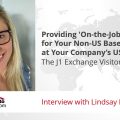Bring Your Foreign High-Skill Talent into US Operations: J-1 Research Scholar and Specialist Visas as Alternatives to H-1B

GlobalAutoIndustry.com’s latest Audio Interview “Bring Your Foreign High-Skill Talent into US Operations: J-1 Research Scholar and Specialist Visas as Alternatives to H-1B” features Gennady Babankov, J.D., Business Development Manager for the American Immigration Council’s J-1 Exchange Visitor Intern, Trainee, and Research Scholar programs. During his 25-year-long career, Gennady worked at the intersection of government, academia, and industry, promoting international programs in academic exchange, professional training, and career development. Since 2019, Gennady has been helping immigration attorneys and corporate employers make J-1 visa programs part of their global talent recruitment and mobility strategies. Gennady is an expert in J-1 visa compliance and cross-cultural training and has a deep understanding of immigrant and non-immigrant employment-based visa rules and practices.
In the 17-minute Audio Interview, Dr. Babankov discusses these questions:
- In our previous webinar on J visas with Lindsay Bongi, we discussed J-1 intern and trainee visas. Please tell us how research scholar and specialist J-1 visas are different.
- The automotive industry, like many other industries in the US, relies on foreign expertise for research, development, and innovation. H1B is, arguably, the most popular visa for skilled foreign talent. You are referring to J-1 research scholar and specialist visas “alternatives” for H1B – please explain why.
- You mentioned a few times that J-1 research scholar and specialist visas belong to the “academic” visa category. Does this mean that businesses that want to use these visas must be connected to the academia?
- It looks like these visas cover a wide range of professional roles. Could you please give some examples of who can qualify as a J-1 research scholar or a specialist?
- How can an interested company find out if J-1 visa is right for them?
- This conversation has come to a conclusion. Do you have any final word of advice for our listeners?

